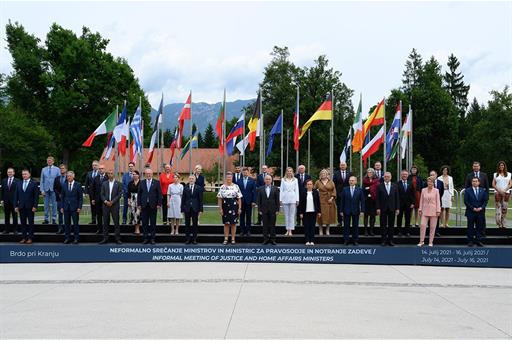Informal Justice and Home Affairs Council (JHA)
Grande-Marlaska calls on the EU to ensure the future Pact on Migration and Asylum "shares responsibilities" among all countries
News - 2021.7.15
The minister made this appeal during the Informal Justice and Home Affairs Council (JHA) meeting in Ljubljana, the first to be held under the Slovenian EU Presidency.
"We note with concern that all the initiatives to advance in the negotiations on the new pact concentrate on rules that demand greater responsibility from the member states of first entry of migratory flows, while in the field of sharing and solidarity, proposals are unrealistic and distant from the agreement", said Grande-Marlaska during the meeting in the Slovenian capital.
The minister insisted once again on the need for the European Union to make a firm commitment to a preventive and cooperative migration policy. "There is an urgent need to make progress on the external dimension by strengthening instruments for collaboration with the countries of origin, reinforcing their operational capacities and establishing a reliable and lasting framework for cooperation". "The reality of migration imposes it on us," he stressed. "We have a few months ahead of us with a foreseeable increase in irregular entries into the EU. We should anticipate and prevent them".
New regulatory framework for artificial intelligence
Grande-Marlaska also shared with his European counterparts the need to promote the use of technology and artificial intelligence in the fight against organised crime and cybercrime, "which have found in the technological revolution a multiplying effect in their criminal actions and the protection of anonymity", he pointed out.
The Minister for Home Affairs has supported the proposal for a new Regulation on Artificial Intelligence, in line with the National Strategy on this matter approved in Spain in November 2020. "Artificial intelligence is not a possibility, but a critical factor of success", he stressed, "but a realistic framework adapted to operational needs is needed, while respecting the fundamental rights at stake. A balance that we have not yet found and on which we must continue to work".
Freedom of movement and security in the Schengen Area
The Ljubljana Council continued the EU debate on the new Schengen area strategy. The Spanish Minister for Home Affairs recalled that the Schengen area "is one of the most extraordinary achievements in the process of European integration" and the EU's objective must be "to approve changes that preserve this freedom of movement, guaranteeing that the common area is secure".
Grande-Marlaska has opted to return to the order of priorities in place at the birth of Schengen and to promote an area of free movement "that adds to the daily lives of our citizens, and that does not sacrifice mobility under the pretext of greater security, which can be achieved by other means, such as the use of new technologies".
Non official translation





